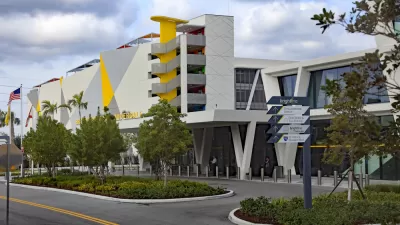Apparently some in Florida were uncomfortable with the much touted "privately funded railroad" using a $1.6 billion Federal Railroad Administration loan, so All Aboard Florida applied for tax exempt bonds to supplement or replace the loan.
"The U.S. Department of Transportation has provisionally approved $1.75 billion in private activity bonds for All Aboard Florida, an unprecedented amount and a move that reduces a major financial obstacle for the express passenger rail line," writes Kimberly Miller, Palm Beach Post staff writer. Unlike a federal loan, these bonds place all liability on the bond issuer, Coral Gables-based Florida East Coast Industries, owner of the new rail line.
A final approval for the bonds is conditional on All Aboard Florida completing an environmental review process which closed for public comment earlier this month. If granted, it would be the largest amount of private activity bonds awarded any single entity.
The project's environmental impact statement, a requirement of the National Environmental Policy Act (NEPA), was published by the Federal Railroad Administration (FRA).
The bonds are needed in part to pay off "$405 million in private high-risk bonds" used for current construction between Miami and West Palm Beach, writes Miller. "Trains between Miami and West Palm Beach are expected to be running in late 2016, with the second phase [from West Palm Beach to Orlando Airport] opening in early 2017."
While All Aboard Florida trains are frequently described as "high-speed," including by Planetizen, the trains will be diesel-powered, running at a maximum speed of 125 mph, depending on the section.
The nation's two true high-speed trains being developed are in Texas, with an opening date of 2021, and California, scheduled to begin operation in 2029.
Hat tip to Heather Caygle of POLITICO Morning Transportation.
FULL STORY: Feds give All Aboard OK to issue $1.75 billion in tax-exempt bonds

Alabama: Trump Terminates Settlements for Black Communities Harmed By Raw Sewage
Trump deemed the landmark civil rights agreement “illegal DEI and environmental justice policy.”

Study: Maui’s Plan to Convert Vacation Rentals to Long-Term Housing Could Cause Nearly $1 Billion Economic Loss
The plan would reduce visitor accommodation by 25% resulting in 1,900 jobs lost.

Why Should We Subsidize Public Transportation?
Many public transit agencies face financial stress due to rising costs, declining fare revenue, and declining subsidies. Transit advocates must provide a strong business case for increasing public transit funding.

Paris Bike Boom Leads to Steep Drop in Air Pollution
The French city’s air quality has improved dramatically in the past 20 years, coinciding with a growth in cycling.

Why Housing Costs More to Build in California Than in Texas
Hard costs like labor and materials combined with ‘soft’ costs such as permitting make building in the San Francisco Bay Area almost three times as costly as in Texas cities.

San Diego County Sees a Rise in Urban Coyotes
San Diego County experiences a rise in urban coyotes, as sightings become prevalent throughout its urban neighbourhoods and surrounding areas.
Urban Design for Planners 1: Software Tools
This six-course series explores essential urban design concepts using open source software and equips planners with the tools they need to participate fully in the urban design process.
Planning for Universal Design
Learn the tools for implementing Universal Design in planning regulations.
Smith Gee Studio
Alamo Area Metropolitan Planning Organization
City of Santa Clarita
Institute for Housing and Urban Development Studies (IHS)
City of Grandview
Harvard GSD Executive Education
Toledo-Lucas County Plan Commissions
Salt Lake City
NYU Wagner Graduate School of Public Service



























